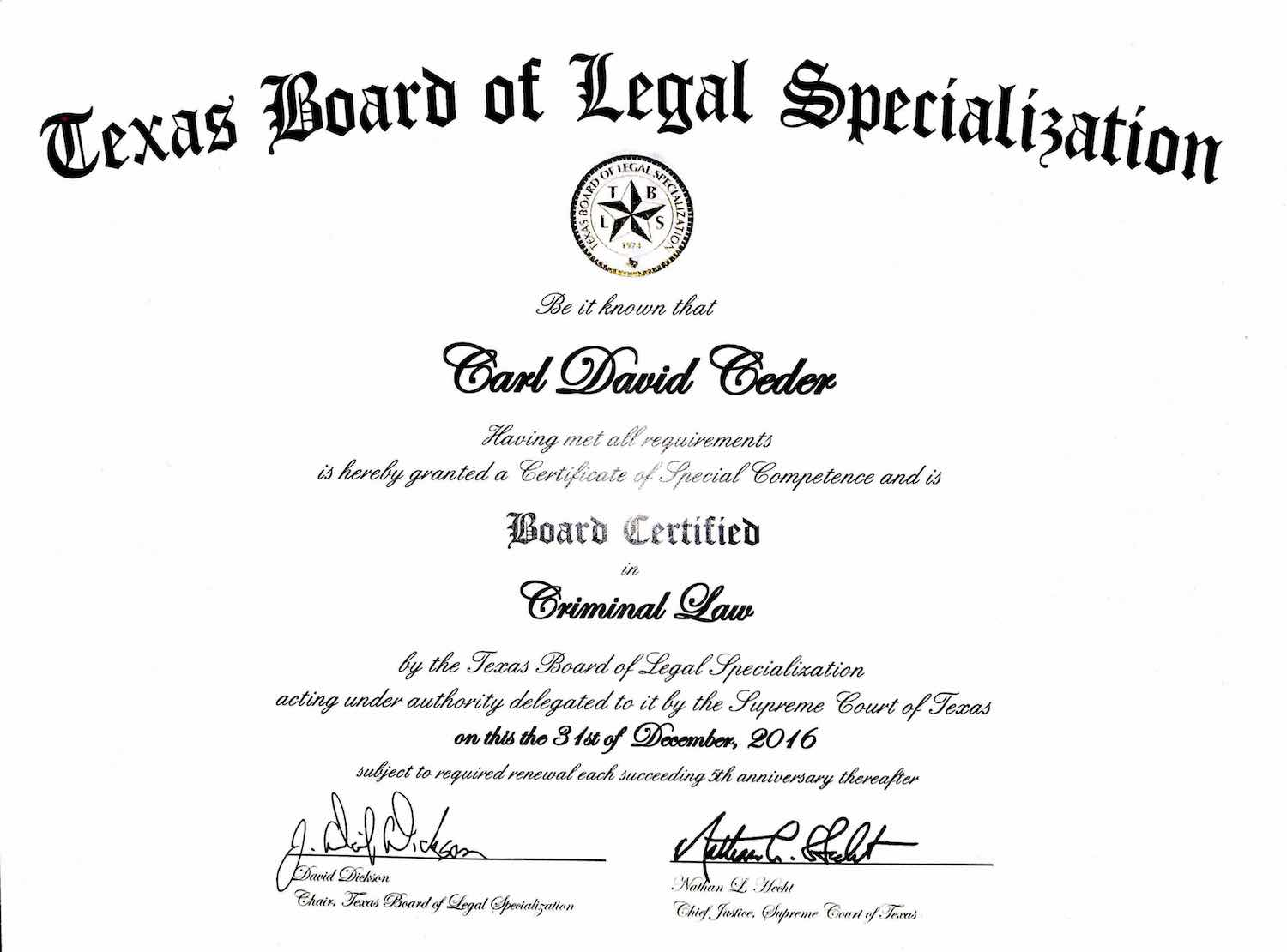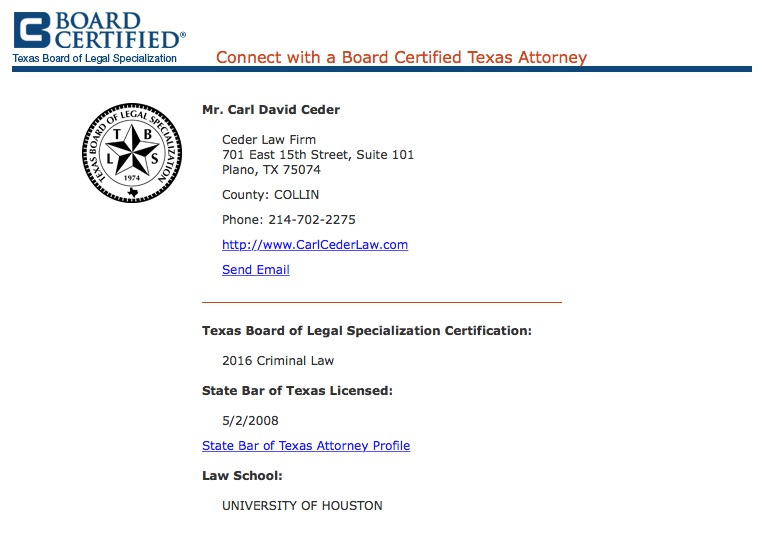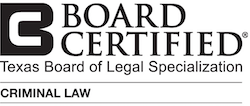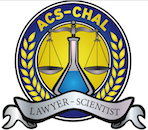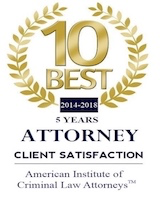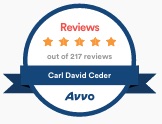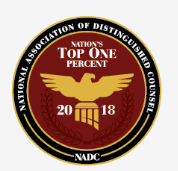Board Certification - My Exam Study Process
I have wanted to be an attorney for about as long as I can remember. However, I never have wanted to be just ANY attorney, I’ve always wanted to be a criminal defense attorney. That is not to say that some other areas of the law do not interest me, because many other areas do pique my interest, and on occasion I find myself working on something that is not related to criminal law.
However, I had an experience with a criminal defense attorney, when I was very young, and after watching him work – I knew that was wanted I wanted to do for a living. It didn’t even seem like work to me. And the thought of possibly providing for myself, earning a living, while doing something so exciting, fascinating, and different than how 99% of other people make their living - seemed like something out of a dream. Long ago - my goal was set to practice law and to represent the citizen accused. I have never had an interest in working full-time for the government to put people in jail.
Since day 1 for me I have focused my practice on criminal defense practice . I tried my first jury trial literally within weeks of being licensed, and I tried my first felony jury trial within the first couple of months of practicing as an attorney. Now, many years later, I can honestly say I haven’t looked back since. While I have practiced other areas of the law, such as family law, immigration, business, contracts, etc. – my main focus and attention has always been on criminal law (noting juvenile law is technically under the Family Code, and thus – codified in family law, but is usually criminal in nature).
I have also wanted to pursue obtaining the designation of being “Board Certified in Criminal Law” by The Texas Board of Legal Specialization since first learning when I started to practice that such a distinction existed. There are many specialties one can try and meet the requirements for to become "Board Certified" by the Texas Board of Legal Specialization (I believe \22 in total), but I have always wanted to be “Board Certified in Criminal Law.” Why? Because for me – it bears the mark of showing that I have been firmly and fully committed to putting forth absolutely everything I have to try and be the best I possibly can at my craft. I am a criminal defense attorney – and as such, it has been important for me to work towards being “Board Certified” in that area of law, because not only is it where my passion lies…like the Army motto dictates, I have always wanted to "be all that I could be."
There are certain requirements that have to be met that are very stringent before one can even apply for any one of the specialty areas. For criminal law, one is having authored and verifying proof of a certain amount of appellate briefs. Since I do mostly trial work, for years I have offered my services in this area for free, in some cases, in order to hopefully gain the requisite experience to qualify to sit for the examination. For anyone that has done an appellate brief before, it is a cumbersome, difficult, and an incredibly tiresome process. It defies all logic offering free services to write an appellate brief for free. I only mention it to note my determination to try and accomplish this goal. Logic didn't apply to me - only me trying to achieve this goal did.
In April of this year (2016), I finally submitted my application to sit for the examination in the area of Criminal Law. I literally spent countless hours putting my application together to make it look as complete and thorough as possible. I had to look up literally everything I had ever done that had any legal significance in the time I’ve practiced law, while listing all information in fine detail. I had to write complete summaries for anything of substance I’ve worked on as an attorney, I had to look up the name and bar number of every Assistant District Attorney (ADA) I've tried a case against since I first started in 2008 ( for some I tried cases against many years ago - some were not even licensed still to practice law anymore and had moved on to other endeavors).
It is also a requirement to list as a reference 10 different attorneys I've worked on a criminal case within the preceding three of years, with 3 of them being Judges I've practiced criminal law in front of, I had to give a complete accounting of all of the Continuing Legal Education (CLE) hours devoted to criminal law I had completed in all of the years preceding the application, and finally – I had to write an overall summary stating my desire and intent for why I sought to become "Board Certification" in Criminal Law.
The entire application process in and of itself was incredibly tedious, time-consuming, and at times incredibly daunting. I painstakingly thought and deliberated as to who to put down as references, thoroughly researched every jury trial I'd ever conducted, tried to articulate as best possible anything significant I'd accomplished in criminal law in my career, and tried my absolute best to write a summary statement that hopefully adequately reflect my complete and utter desire to have the opportunity to take the "Board Certification" examination in Criminal Law. This may not sound like it would be that difficult of a task to complete – but for me, I agonized over every detail of my application before submitting. I had been preparing for this for years, accumulating and keeping lists of of everything over time I thought would be relevant so I could list it when I finally decided to apply. For me, it is the ultimate accomplishment one can seek in the practice of law - especially with Criminal Law. Simply put - it means you are serious about doing this type of work, and it's not something that I do just to make more money or because I have to.
As stated previously, the application process itself is a large and daunting task. Yet, I was determined. I wanted my application to 110% reflect everything I’ve tried so hard to achieve in my time as a criminal defense attorney. I felt at times it was hard translating on paper just how badly I wanted to have the chance to take the exam, and how long I've worked to help meet the requirements. Just the same – I tried to lay it out all on the table, leaving nothing on the field, and gave everything I could in completing my application as thoroughly as possible.
Once the application was in – I waited anxiously to hear if I would be given the go-ahead to take the examination. I gave myself a 50/50 chance of the application coming back approving that I met the strict requirements to take the actual written examination. I felt kinda like this was a test run for maybe how I could revise my application for the following year.
I felt that maybe because I had never worked as a prosecutor, or didn’t have overwhelming substantial experience in the appellate arena, etc. – might give the selection committee pause as to whether my credentials were satisfactory. Still – I anxiously waited with high hopes, because this was of the utmost importance to me.
In July of this year (2016), I received a letter from The Texas Board of Legal Specialization stating that my application had been approved to sit for the 2016 Board Certification Exam in Criminal Law. I was ecstatic. Elated. A bit shocked. And a bit scared.
My emotions ranged from one degree to another because this was so important to me. In a way, I took some satisfaction just knowing that my credentials were reviewed, and after considering my qualifications, it was determined that I met the criteria to even sit for the examination. My excitement was short-lived because I almost immediately went to work studying. Once receiving the letter, I placed myself on a strict study regimen, literally daily, with full days on each weekend day focused on going down my checklist of things to master for the exam.
I prepared for months studying for the actual exam. Once an application is accepted, information is then given as to when the examination will take place. This year, it was held on October 17th, 2016. The examination for any specialty is only given once a year, at the same time.
When studying – I didn’t want to leave anything to chance. Once an application is accepted, you can take the examination twice without having to resubmit another application (with the caveat you have to wait an entire year before being able to take the exam again). It was the first time I submitted my application (you can take the test twice – so if you are not successful in passing the first time, you can take it again the next year without having to resubmit another application).
While I thought there may be a real possibility that I may have to take the examination again the following year (or maybe even the year after that) I still wanted to cover all my bases when studying material to be fully ready. I started almost immediately studying for the exam once I received my approval letter in July of 2016. From July until the October exam date, I studied every night for around 4 hours – sometimes more, sometimes a bit less. On weekends, when I did not have to work, I went to a Starbucks, with nothing but my study material (I would not bring a phone or computer to lessen distractions), and studied for approximately 8 hours each day, with a small lunch break to help revitalize my mental sharpness.
When my parents were in town, I was lucky enough to have them assist in helping me stick to my routine. They would drop me off at a Starbucks and pick me up at an appointed time. Regardless of what was going to be covered on the actual examination, I wanted to know in my heart that I had studied everything I could get my hands on, and tried to do everything possible to put myself in a position to be successful.
I probably over-studied. I think the difficult part about the Legal Specialization exam in Criminal Law is that it covers both State and Federal criminal law and procedure, and also has a strong emphasis on the appellate process (both state and federal). For those that do not know and are reading this – state and federal criminal law and procedure could not be more different…in almost every possible way. Trying to remember the distinctions between each may have been the most difficult part of the studying process.
What I also found refreshing were reviewing areas of criminal law that I thought I had a full and comprehensive understanding of – but realizing there is always room for improvement to learn and understand more. Why? Because laws are constantly changing. I felt the areas I would have thought the most comfortable for me, based on my experience in the practice of law, were perhaps the most difficult to study in many ways. It was vital to re-wire my brain to learn and properly understand all concepts of criminal law, even the areas I thought I knew the best.
I studied everything I could get my hands on that may be on the exam. I took meticulous notes, made a variety of outlines, used note cards to help the memorization process for certain concepts I knew I needed to remember on instant recall, made my family quiz me over topics I knew I needed to remember and have instantaneous knowledge of, I made them listen to me as I verbally would explain certain concepts to them (my logic was I felt if I could explain it to them, I not only understood it myself, but also could also most likely proficiency convey my knowledge on the subject when I finally took the exam).
I read the Texas Code of Criminal Procedure. Verbatim. I read just about every portion of the Texas Penal Code. I studied the Texas Rules of Evidence, and made meticulous notes on the subtle distinctions between how the Texas Rules of Evidence are different than the Federal Rules of Evidence. I read the Federal Rules of Criminal Procedure (actually read them verbatim each rule 3 different times throughout the process - once at the beginning, once in the middle, and once right before exam day), read and reviewed most of the main applicable federal crimes and the statutes , thoroughly reviewed the Federal Sentencing Guidelines (how they work, the policy behind them, how they interplay with certain federal and state crimes, possible variances, departures, etc.).
I printed off every document I could find on all of the above, and more. I read a well-published book on Federal Law, titled “Busted by the Feds” – which almost every federal prisoner has knowledge of, or has in their possession - solely to help me better understand the overall Federal system and how it works. I read all the recent Texas Criminal Court of Appeals decisions, and the most recent United States Supreme Court updates, from the past 2-3 years.
I did all of the above. Then…I did it all again. And after I was done reviewing all of the above…I did it again. And again. I didn’t stop from July until I took the test in October…quite literally. I studied, repetitiously topics I likely will never encounter in my legal practice career during the entire course of my legal practice. I specifically studied the differing nuances of federal appellate practice – in great detail – just in case possibly there was a question relating to something post-conviction following a federal criminal trial. The appellate differences between state and federal law could not be more different.
I studied so hard, at times, it seemed like my hands almost bled from work and writing. Some of my notes I hand wrote in my hand notebook to help remember important concepts towards the end, and as the exam approached, started crumbling from wear and tear, and even started to be not legible.
Around July (of 2016) when I first started studying, I remember watching the movie “Lean on Me” with Morgan Freeman as a High School Principal. In the movie, the main event he has the kids work for is passing a written proficiency examination for high school students in their state, and he was determined to meet the mandated required passing percentage rate required of his student body. In the movie, at one point, Morgan Freeman chastises a young boy when he sees him in the hallway and remarks to him, “Where are your books? Why aren’t you studying?” I think I remember this excerpt so well, because I would think of it throughout the overall process – and so just like in the movie, I felt like if I went anywhere, I should have readily available material with me on hand should I find myself in a situation with spare minutes to study.
I took notes to the gym, to court with me, I had various books next to my bed to read before I went to sleep, when I went out of town I would always bring a full bag of books and study material with me on topics I knew I needed to cover and master. A couple of times I drove out of town to see family, and on each trip, I passed the driving time with a notebook in the passenger seat, and would question myself on topics I knew I needed to have ingrained in my memory. I quizzed myself over deadlines, statutes of limitations, differing prongs of varying laws, exact language required for specific statutes, etc.
I probably over-studied, and as I was going through it – I knew this would likely be the case. After all, the examination is only 6 hours, the first half of the day is a 3-hour essay portion, and the latter half is a 3-hour multiple choice section. When reflecting on how much I studied, I knew it would be impossible that everything I read, charted, graphed, outlined, and made acronyms for would actually be covered on the test.
Regardless, I wanted to be fully ready when I took the examination on October 17th (of 2016). I knew that with my preparation if the situation dictated where I would have to sit again and study the following year, I knew everything I covered would be all the more easy to study and review if faced with having to take the test twice.
In the end, regardless, what kept me going was that - even when studying portions of criminal law that likely would not be tested – I knew, above all else, deep down I felt the overall studying process was making me a better attorney. I had to study concepts, and areas of the law, some of which I had little experience in (there are many different areas of criminal law, obviously – both at the state and federal level). It energized me, even through the some of the more tedious topics, because deep down that even if some of my studying was spent in vain (and not covered on the exam), I honestly knew I was making myself a better at my chosen craft of being the best criminal defense attorney I can be..
When I took the examination in October of 2016, I felt I had a pretty good grasp knowing how difficult the exam would likely be. I had heard stories from those who had taken it before. Many pass on the exam because the horror stories from those who studied hard and did not end up with the desired result. However hard I thought it was going to be....I was 100% wrong. It was harder than anything I could have possibly imagined. The word “hard” doesn’t adequately describe just how difficult it was taking the examination, and how much of an endurance process it was.
The first half of the examination consisted of the essays. I truly felt that I had a full and complete understanding of everything that the material covered and tested. However, going in, I was not fully aware of the ridiculously tight time constraints one has to adhere by to properly address all of the relevant issues that are tested. The hypothetical fact patterns were unbelievably long, I believe all were multiple pages in length – one being approximately 3 pages total. The number of issues each presented seemed endless, and one could truly have spent an entire day writing out and properly addressing all relevant issues for just one of the essays, let alone 3 of them – but the task was having to do so, for all of them, within the time constraints and within a 3-hour time period.
It was difficult, but I was determined to try and pour everything out in my head on paper so the graders might see my overall breadth of knowledge in criminal law, my ability to spot the issues, and my skill in being able to appropriately apply the law to the facts of each hypothetical scenario.
Also, the issue of dealing with how to function taking the test with ExamSoft (perhaps technology is passing me by) provided another hurdle to overcome. Even though I practiced beforehand, I never fully understood how to successfully maneuver in ExamSoft, as it is much different than writing in Microsoft Word. After the examination, I prayed my lack of knowledge and ability to use ExamSoft would not hinder the graders in being able to accurately assess my ability to identify each issue presented, analyze the law and facts proficiently, and then write about them in a professional and legal manner as if presented before a tribunal (like if written as a legal brief or memo to a Judge, pursuant to what the instructions stipulated).
An older attorney told me before I took the exam that when he took the exam years ago (he himself is “Board Certified in Criminal Law” by The Texas Board of Legal Specialization), one of his friends he took the exam with literally walked out in the middle of the test after being frustrated by how difficult it was. When answering the multiple choice questions, I fully understood why. They were beyond difficult – and made the Texas bar exam seem like questions designed to be answered by toddlers.
I haggled over the right answer for each, trying to recall everything I studied to help accurately pick the correct multiple choice question. Regardless of the overall knowledge of an individual taking the examination, I think all would agree that the multiple choice questions are incredibly difficult, and literally every answer seems right.
I am a perfectionist by nature, so I scrupulously went over each question, and thoroughly evaluated each answer in agonizing detail. For weeks after the exam, I would remember a question that had perplexed me, and I would not be able to rest until I properly looked up the correct answer to help put my mind at ease.
After the examination itself, honestly – I did not give myself an extremely high percentage chance of passing. Perhaps because I am a perfectionist –for weeks, and even months, the portions that I did not know, or those sections I felt I didn’t answer in ways I felt truly reflected my knowledge of criminal law – plagued me and convinced me that my chances of being successful were not the best. All I could think about after the examination were the areas I felt I didn’t perform optimally on, and the multiple choice questions I was sure I missed (I had almost total recall of the questions that vexed me – and would kick myself when identifying those that I knew I answered wrong.) I had it in my brain that I must have shown some deficiency the graders would focus on, and because I didn’t feel like my examination truly reflected my knowledge of criminal law, I was far from optimistic.
The grading process takes approximately 3-4 months, and I tried to put whether or not I passed out of my mind completely. They said we would get results around mid-December, and because I received the letter via U.S. postal from The Texas Board of Legal Specialization when my application was approved to sit for the exam, I figured they would use the same method to inform those of the results. I decided regardless, if I got a letter in the mail at any point before the New Year from The Texas Board of Legal Specialization – I would not open it until well after the holiday season. I did not want to dampen my holidays with receiving bad news, and didn't want to spend this time in a cloud of regret and disappointment.
I was beyond delighted when I opened an e-mail on January 3rd, 2016 that informed me that I had passed the examination and met the requirements for “Board Certification in Criminal Law” by The Texas Board of Legal Specialization. As stated previously, I had expected the news to be delivered via U.S. Postal– but I opened and read the e-mail before I knew what the content of the message was about.
When I opened the e-mail and read that I had passed, I am not too proud to admit that I didn’t have to fight back tears of joy. I was at court when I opened the e-mail, and I had to maintain my composure. Still – the news informing me that I had passed the examination was honestly one of the most important moments of my life. I studied so hard for the exam, and I wanted to pass so badly – the realization that all of my hard work paid off was more rewarding than I expected it to be.
I had prepared myself for the worst – and even if the news did not come back positive for me, I was equally determined not to downplay the significance of being a “Board Certified” Attorney, and/or my quest to achieve this prestigious designation. It seems through the years I’ve heard countless other lawyers state their own particular reasoning why they felt the distinction mattered little (some I learned at one point or another had failed the examination, and I think that played into their thinking that being “Board Certified” was not worth seeking to accomplish).
When I read the e-mail indicating that I had passed the examination, I wasn’t sure I had read the e-mail right, until I checked my Facebook wall, and read Judge David Newell, who presides over the Texas Court of Criminal Appeals (the highest court level in Texas which preside over criminal cases…basically the Supreme Court in Texas for criminal cases) – congratulating me for passing the Board Certification Exam in Criminal Law. I knew then that the news was good – and I had not misread the e-mail message in some way.
I love football, as does my whole family. When I knew I passed, the best way I can convey how my feelings were similar to how Rudy Ruttiger felt (in the movie Rudy) when he finally received news his enrollment was accepted into Notre Dame. In the movie, he had enrolled in a Junior College near Notre Dame, in hopes of at some point accumulating enough credits, and sufficient grades to be accepted for admission as a Notre Dame student.
He tries multiple times without success – but his determination is unwavering. I believe there were only a certain number of times one could apply, and on his last effort and his final application – he finally learns he was accepted into Notre Dame. In the movie, as he is reading the letter, he is sitting on a bench on campus and he weeps as he reads the news he waited so long for. His hard work finally paid off.
This is the best and only comparison I can make to how I felt. I had finally received great news about something I had worked so long and hard for, over many years, including literally countless hours from July to October of 2016 spent studying for the exam. I have wanted to achieve this designation for a very, very long period of time. I waited and patiently tried to accrue enough experience before finally submitting my application because I wanted everything I presented to be perfect when the committee reviewed my legal background.
Now that I am “Board Certified in Criminal Law” by The Texas Board of Legal Specialization – I can honestly say that the road getting here was completely worth it. It was hard, fraught with difficulty, many times I wanted to quit (even during the test itself), I often found myself telling myself that being “Board Certified” didn’t really matter anyway in the long-run (like many attorneys say, who I believe some have the mindset because they are unwilling or unable to commit to doing all of the above)…but in the end, the end justified the means.
Carl D. Ceder, Board Certified in Criminal Law Profile - The Texas Board of Legal Specialization located: HERE.
I wanted this as much as any other accomplishment in my life. I know it was many years ago, but I am still extremely proud that I was able to graduate salutatorian (2nd) out of a large high school class in Austin, Texas. I am proud of this fact, I think – in large part, because of the commitment it took to achieve it. I worked hard to try and obtain it - because I knew it was something that was an accomplishment that would stay with me forever.
I was proud of graduating in less than 2.5 years with my B.B.A. in Finance from The Red McCombs School of Business at The University of Texas at Austin, I was also proud when I graduated from law school and earned my Juris Doctorate in less than 27 months, but still I did not hold any other accomplishments I have achieved over this. Likewise, I barely noticed when I checked the results of the Texas Bar Exam and saw that I passed (it is posted on the web for all to see, I remember seeing my name, but I was in Thailand traveling at the time – and was probably more concerned with where my next dive trip would be), etc. During the time I've practice law, following hard work that pays off with successful results after a jury trial - I am usually more excited for the client than I am for myself.
When I texted some of my colleagues that I had passed the “Board Certification” exam– one friend, after I related how much work it took to achieve this designation, asked if I would I do it all over again if I had to. I don’t remember how I answered, but what he remarked back I will never forget. He texted me back something to the effect of, “you can now list this as a credential forever.” I thought about this - and this is true. And perhaps why I am so proud and humbled by this accomplishment. Once you pass all the strict requirements the process takes, it is not something you have to EVER undergo again. Its something that once achieved, as long as you meet the basic yearly guidelines in your specialty area and continue to practice in that field – the distinction is something you can list forever. It is not an award that is given yearly, or an achievement where you have to repeatedly do things in order to maintain membership status.
When he said this, I thought of what Steve Young, the San Franciso 49’er Quarterback said after winning the Super Bowl after being in the shadow of Joe Montana for the majority of his career, (again a football reference). He said something to the effect of “No one can EVER, EVER take this away from us!” His words were strong, powerful, and emotional - you can literally hear how gratifying the achievement was to him after toiling so long to try and obtain the highest award there is in football.
That is how I feel about passing the rigorous requirements, after so much how hard, in obtaining the distinction being “Board Certified in Criminal Law" by The Texas Board of Legal Specialization.
Steve Young Super Bowl Victory (at 2:13 mark):
https://www.youtube.com/watch?v=useIGukkoJY
